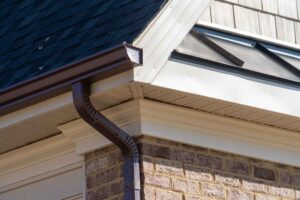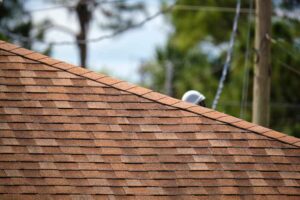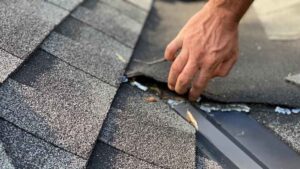Did your home recently suffer storm damage? Or maybe it has reached the end of its lifespan? If you’re asking, “When should I replace my roof?” and wondering about the best time to replace a roof, you’re not alone. In Dallas, where severe weather can take a toll, recognizing the ideal moment for a roof replacement is crucial. Here’s a breakdown of why you might need a new roof and some essential tips to ensure you get the job done right.
Why Consider Roof Replacement in Dallas?
1. Age of the Roof: When Should I Replace My Roof?
One of the biggest indicators that you need a new roof is its age. Roofs generally last between 20 to 25 years, depending on the material. If your roof is nearing or surpassing this age, it’s time to think about a replacement. Procrastinating could lead to unexpected leaks and costly damage. The best time to replace a roof is before it begins to fail. By planning ahead, you avoid the stress and expense of emergency repairs.
2. Frequent Repairs: Roof Replacement Tips
If you’re constantly fixing issues with your roof—whether it’s sealing leaks or replacing damaged shingles—you should consider a full replacement. Frequent repairs can quickly add up and may only address temporary fixes. Replacing your roof can save you money in the long run. It’s more cost-effective to invest in a new roof than to keep patching up an old one. Look into having your roof inspected to weigh the benefits of a replacement versus ongoing repairs.
3. Visible Damage: Recognize the Signs
Inspect your roof regularly. Look for missing, cracked, or curling shingles. If you spot granules from shingles in your gutters, that’s a sign of deterioration. For tile or slate roofs, check for broken or displaced tiles. These visible signs of damage can compromise your home’s protection. Addressing these issues promptly will help you avoid more extensive damage. Keeping an eye on your roof’s condition can save you from future headaches.
4. Leaks and Water Damage: A Clear Indicator
Leaks and water damage are significant red flags. Water stains on your ceilings or walls suggest that your roof’s integrity is compromised. Persistent leaks can lead to severe problems like mold or structural damage. It’s crucial to address these issues immediately. Replacing your roof can restore your home’s protection and prevent further deterioration. Don’t let small leaks turn into major problems.
5. Energy Efficiency: Improve Your Home’s Comfort
An old roof can affect your home’s energy efficiency. If your energy bills are rising, it might be due to insufficient insulation from your current roof. Modern roofing materials are designed to boost energy efficiency. Upgrading can help you cut down on utility costs and keep your home comfortable year-round. Investing in an energy-efficient roof can lead to long-term savings and enhanced comfort.
6. Storm Damage: Assessing the Impact
Dallas is no stranger to severe weather, including hail and high winds. If your roof has taken a beating from a storm, it’s crucial to assess the damage. Sometimes, storm damage is severe enough to warrant a complete roof replacement. A professional inspection will help determine the extent of the damage and guide you on the necessary steps. Don’t wait for the damage to worsen—address it right away.
Roof Replacement Tips for Dallas Homeowners
1. Hire a Reputable Contractor
Choosing the right contractor can make all the difference. Look for companies in Dallas with a strong reputation and positive reviews. A reputable contractor will provide a detailed estimate, explain the process, and use top-quality materials. They’ll guide you through each step and ensure that your roof replacement goes smoothly. Don’t settle for less—find a contractor who stands behind their work.
2. Choose the Best Time to Replace a Roof
Timing can influence the cost and efficiency of your roof replacement. In Dallas, the best time to replace a roof is usually during the spring or fall. These seasons offer more favorable weather conditions for roofing work. Replacing your roof during these times can lead to better installation results and potentially lower costs. Avoid scheduling your replacement during peak summer or winter months to prevent weather-related delays.
3. Select the Right Roofing Materials
There are various roofing materials to choose from, each offering different benefits. Asphalt shingles are affordable and versatile, while metal roofing provides durability and energy efficiency. Cedar, tile, and slate have unique aesthetics and benefits. Discuss your needs and preferences with your contractor. They’ll help you pick the right material for your home and budget, ensuring you get the best value for your investment.
4. Prepare for Unexpected Issues
During a roof replacement, you might uncover underlying problems, such as structural damage or ventilation issues. Be prepared for possible additional costs if unexpected issues come up. A good contractor will keep you informed and address any concerns that arise. Having a plan in place for these contingencies will help you manage the process smoothly and avoid surprises.
5. Understand Warranties
Before committing to a roof replacement, make sure you understand the warranties offered by both the manufacturer and the contractor. A comprehensive warranty provides peace of mind and protection against future issues. Review the terms carefully to know what’s covered and for how long. Warranties can vary, so choose options that align with your needs and offer the best coverage.
Your Path to a Stronger, Safer Roof
Understanding when to replace your roof and recognizing the signs of damage are key to maintaining the safety and value of your home in Dallas. If you’re dealing with issues or your roof is nearing the end of its life, don’t hesitate—contact Roofing Ranger for a professional inspection and expert advice. We’re here to guide you through the process and ensure your home remains secure with a high-quality roof replacement.



